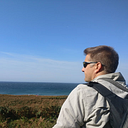The orchestra is out of sight, just beyond the stage where commuters stand as they sup coffee from plasticated cardboard and staring at glow-screens held in front of illuminated faces. The orchestra is unnoticed. Beyond the dreariness of the commuters’ routines, beyond the concrete, I can hear a tumult of voices, an intertwined cacophony of song.
Straining eyesight beyond the platform floodlights, there’s little to be seen. It’s just a little past 7am in the morning, still dark at this latitude. The contrast between light and dark makes it harder still to see beyond the fringe of the railway line. The darkness saps the colour from the landscape, rendering everything as cut-out shapes, silhouetted against the orange-grey glow of the city beyond.
The stage is an untamed wooded copse, a stand of mixed trees in a pathway-bound triangle of parkland. A small patch of land where football fields give way to uncultured nature. Through the morning gloom, trees loom, muddled-together in an unplanned throng.
To hear this performance, all you need to do is tune in; remove sound-dampening headphones, look away from the screen, turn your mental dial and focus on the sound. So simple and yet, not one in a hundred takes the time. A virtuoso one-off performance without charge, without tickets; a morning gift. Like a street busker without a hat, seeking no payment.
In the ten minutes I listened, I only saw one bird as it flitted from a high branch into the density of the copse. A brief black shape, a sudden furtive movement as if hiding something from prying eyes that snuck across the streetlight-sky.
The voices are uncountable-incalculable. I can distinguish, by location, maybe three soloists whose songs pierce through the background hubbub. The rest rise and fall, voices merging into a tapestry of sound; high, low, loud, soft, left, right, fragments and songs. Different colours and textures woven into the fabric.
So much abundance, but is it? A 2019 report from the UK Department for the Environment Farming and Rural Affairs, an unwieldy name for an unwieldy government department, tells a mixed story. Britain has lost around 10% of its birds since the 1970s, with some species declining at a greater rate than others.
Farmland birds have been hit hard by modern farming techniques as hedgerows, field expansions and mono-cultures have eaten away at habitat. Homeless birds do not fare well. ‘Jack of all trades’ birds, the generalists that don’t need a particular niche have fared better. Starlings have suffered a strong decline, Blackbirds are largely unaffected. Two birds that naturally co-exist in our list of garden birds but with very different prospects.
Whatever the scientifically-robust survey statistics say, the simple fact remains, many popular birds have reduced populations driven by our changes to their habitat.
Now a Blackbird takes the stage for a solo. His song has three lines. First a “chewipp, chewipp, chewipp,” verse, each vocalisation punctuated by a half-second intake of breath. Then a high to low pitched “phewww”, its bomb-falling trajectory a full second long. Finally, a “pweeep, pweep”, each note less than a second and steady like an electronic tone.
The word ‘syrinx’, the organ that creates bird song, is derived from the Greek word for pan-pipes. A multi-voice instrument, it’s situated by the bird’s lungs and is capable of seemingly disproportionate volume. Straining to differentiate the voices, I almost wince when a particularly piercing note reaches my over-extended eardrums.
Other voices harmonise, wheeling in and out of the Blackbird’s soliloquy. A multitude of different refrains; a high-pitched repeated “seesaw”, an underlying tinkling-twittering of sound, a conversational tweetering, a distressed-mouse squeaking sound. One bird repeats an eloquent bird-sentence, best recreated by whistling “six, six, six six, four, five” at the pitched of a boiling kettle whistle.
A transient, never to be repeated virtuoso performance. Evolving and revolving. Unrecorded. Unremarked. Unnoticed. Unless you tune in.
If you enjoy reading stories like this and want to support me as a writer, consider signing up to become a Medium member. It’s $5 a month, giving you unlimited access to stories of Medium. If you sign up using my link, I’ll earn a small commission.
